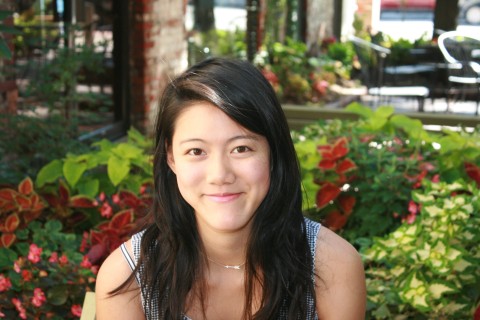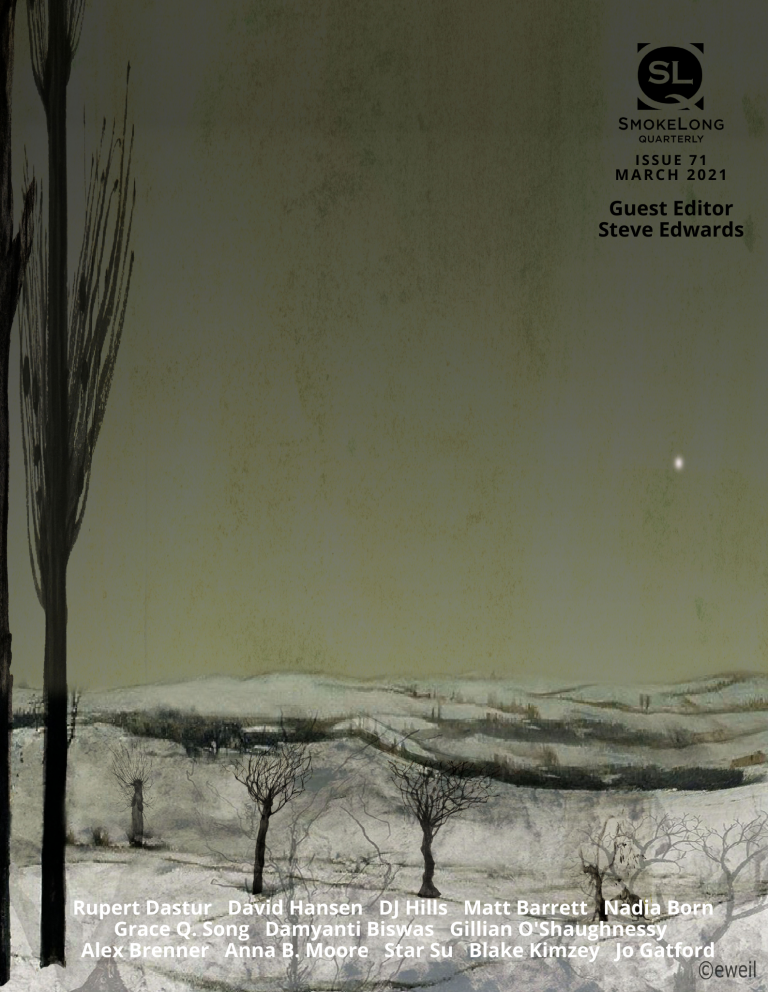The masterful way you’ve structured “Bone Ache” packs an emotional punch. We learn about the theft of the jewelry before we learn exactly how big a deal it is that the jewelry was stolen. And right when we fully understand the true significance of the mother giving the narrator her pearl necklace, an heirloom and the last piece of jewelry she has, we watch the narrator give it back. What was your process like when deciding to structure the story in this way?
It wasn’t a conscious decision to structure the story this way. I was obsessed with heirlooms at the time, how an object can occupy a lot of personal history and fiction to a mother, only to be discarded by a daughter. There were several very bad drafts, all with a pearl necklace. I think the problem with them was I was trying to create this artificial hunger. Once I realized hunger doesn’t go from point A to B, nor is it easily sated by C, I felt free to just see what the characters desired, the grudges they held.
I was also thinking a lot about the way my family would tell an origin story of a watch or hair clip. It would totally begin with the sisters they fought, thieves inside and outside of the family, number of oceans crossed, scars on their skin, on the house. It would have a lot of holes.
Does the narrator know—really know—what it means to give the pearls back to their mother?
When the mother reveals how to tell true gold from fool’s, the narrator reaches for a fact of equal weight. I think giving back the pearls was a gut reaction—she doesn’t want to believe that her grandfather doesn’t love her enough to buy something real. The narrator wants her mother to feel that wound. Of course to answer your question, I don’t think she knows what she is really rejecting.
This grandfather seems slippery. He slips away from the Japanese, slips away from the curses woven into the mother’s tongue, and even manages to slip into the narrator’s good graces. He also seems to dote on the narrator (cracking pig bones, buying presents, trips to the zoo) more than he did the narrator’s mother or even his own sisters. Which do you think is the truest version of a person? Who they were in their past or who they are to you, in the present? Which is the truest version of the grandfather?
I love this question! I am always fascinated by the way we don’t really know our characters just as we don’t really know people. People have pasts that manifest in the present in strange and unexpected ways—it’s hard to recognize a lover during moments of conflict, or see that a mother’s grudge is older than you.
To me, the grandfather’s relationship with the narrator is redemptive. Not that he succeeds, but an apology can be a silence that doesn’t ask for anything. He starts over with his granddaughter, taking her to the circus, opening food for her. I think there’s a version of him that is doing everything he wanted to do with his daughter.
And all the versions you mentioned—wily and arrogant brother, negligent father, doting grandfather—allow us to witness him as only human. I want to believe that the truest version of someone is the one you allow yourself to see. I want to believe that when I know someone, really know them, we can forgive each other for our darkest, shittiest self.
This sentence was particularly striking to me: “It took many years for me to realize that Jesus had a Chinese name.” It is hard to read that sentence juxtaposed with the rich cultural details of this story and not think about immigrant generations and the history, language, and artifacts that are lost over time. Were you thinking about this while writing “Bone Ache?”
I wasn’t thinking of this loss as I was writing the piece, but I’m really happy it came through. I was focused on images that filled in gaps of history for me: poetry on rice paper, games of poker, American newspapers, and fresh cream. Like many immigrants, my parents barely spoke about the past and, when I was younger, I thought we were spies. We spoke a language no one else understood (Shanghainese) and there were barely any personal artifacts at home. The objects we did possess were inexplicable—like faith. I wanted to convey that confusion and ordinary fantasy that rises to answer. Where did this come from? How can I reimagine its birth? Its future?
Do you wear jewelry? If you do, what’s your favorite piece, and why?
For almost nine years, I’ve worn two silver rings. They’re my favorite pieces—my mother gave them to me.



 The SmokeLong Grand Micro Contest (The Mikey) is now an annual competition celebrating and compensating the best micro fiction and nonfiction online.
The SmokeLong Grand Micro Contest (The Mikey) is now an annual competition celebrating and compensating the best micro fiction and nonfiction online.